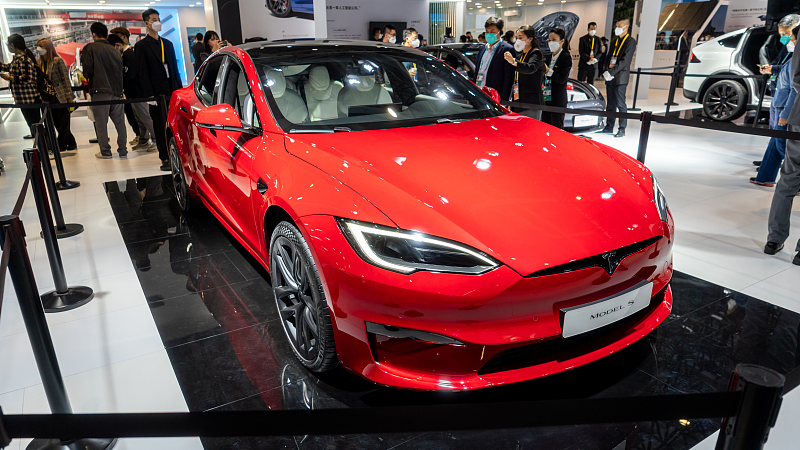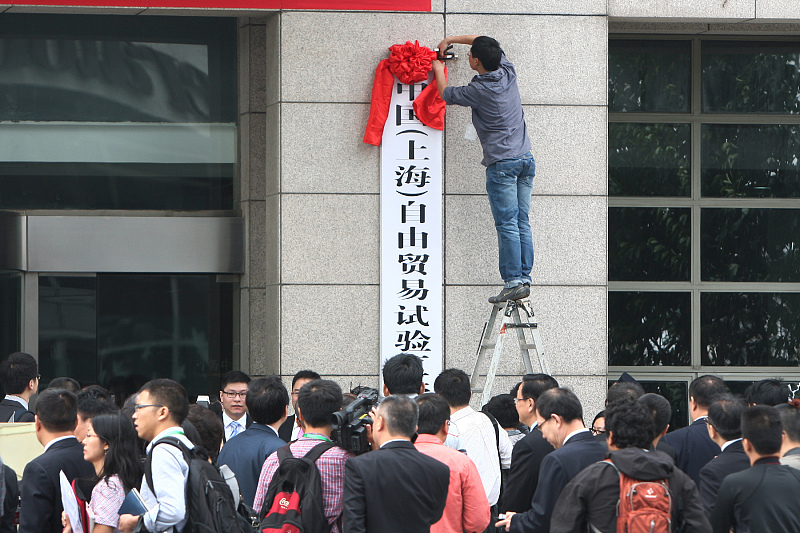
Tesla EV shown at the 5th China International Import Expo in Shanghai, November 7, 2022. /CFP
Tesla EV shown at the 5th China International Import Expo in Shanghai, November 7, 2022. /CFP
Editor's note: Wu Chuping is a Beijing-based international observer. The article reflects the author's opinions and not necessarily the views of CGTN.
Last November, Tesla unveiled its Model S Plaid and Model X Plaid at a trade fair in Shanghai, where the automaker's first overseas Gigafactory is located. More than 2,800 businesses from over 100 countries joined Tesla at the China International Import Expo (CIIE) to display their latest products and ideas to court 1.4 billion Chinese consumers.
2022 is the fifth year that China held the import fair. China looks to create more trade opportunities and draw more foreign capital.
China was a magnet for foreign investment in the pre-COVID era. Even as the pandemic rages on, China's dynamic zero-COVID policy and supply chain disruptions have not prompted a mass exodus of foreign investment. China has a unique position in the global industrial network and is a vast consumer market open to foreign companies.
For some, things seem to be changing. As these people see it, while still advocating globalization, Beijing is talking about losing no time in building a "dual circulation" paradigm, which takes the domestic market as the mainstay and looks to foster a positive interplay between domestic and international economic flows. And all this has come amid heightened great power competition.
Washington has called Beijing the most consequential geopolitical and serious long-term challenge. The U.S. government, citing security and other reasons, has sanctioned over 1,100 Chinese entities and individuals, imposed sweeping export controls on high-end semiconductor goods and services to China, and prohibited companies from getting federal subsidies should they make significant transactions to expand chip-making capacity in China.
The intent is to stop China's tech rise. International observers and investors are watching with concern that these measures may exacerbate decoupling between the two major powers and compel China to seek self-reliance.
Despite decoupling risks and supply chain disruptions, there is no major shift for China's opening-up policy. Beijing has reassured the world that the country will stay open and at a higher level. In his address to the opening of the CIIE, Chinese President Xi Jinping reaffirmed the country's commitment to sharing opportunities with the world through its "institutional opening-up."
Institutional opening-up is a new concept put forward by China in 2018. It's the systematic opening-up based on regulations, management and standards, as compared to opening-up based on flows of goods and production factors, which has been reinforced over the years.
China's plan is to dovetail its domestic policies with international rules and standards. By offering pre-establishment national treatment, shortening the negative list for foreign investment, and breaking local barriers to form a unified national market, China can attract and keep more foreign investors in the country.
Tesla became the first wholly foreign-owned automaker in China, right after Chinese authorities scrapped the foreign ownership cap on new energy vehicles in 2018.

The opening ceremony of the Shanghai Pilot Free Trade Zone was held at Waigaoqiao, September 29, 2013. /CFP
The opening ceremony of the Shanghai Pilot Free Trade Zone was held at Waigaoqiao, September 29, 2013. /CFP
In 2013, Shanghai was the only free trade zone in China. Today, 21 pilot zones have been set up nationwide. The southern island province of Hainan, a popular tourist destination, is transforming into a free trade port to test the waters with wider opening in the financial sector.
China has also accelerated its steps to expand institutional opening-up by completing investment agreement negotiations with the European Union, applied to join the Regional Comprehensive Economic Partnership and Digital Economic Partnership Agreement, and inked cooperation agreements with 149 countries and 32 international organizations under the Belt and Road Initiative to enhance global connectivity in trade, infrastructure and policy.
For China, getting integrated into the world is a double-edged sword by providing huge benefits to the country's growth while increasing the risk of exposure to external shocks. All major and growing economies must accept this. For other countries, to decouple from the world's second largest economy and top trading partner for over 120 countries and regions will incur unbearable costs, and the attempt to hurt others will only boomerang.
The international community can rest assured that opening-up will remain high on China's agenda as it pursues high-quality development. But it should also be resolute about the various red lines: The Socialist system must not be touched; national security is a prerequisite; and the world must make sure that the planet still exists should Washington's crazed crackdown on China and major-country wrestling turn ugly.
(If you want to contribute and have specific expertise, please contact us at opinions@cgtn.com. Follow @thouse_opinions on Twitter to discover the latest commentaries in the CGTN Opinion Section.)